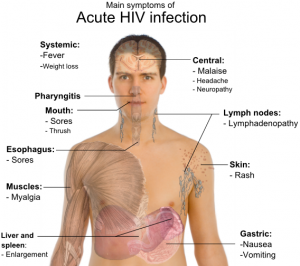AIDS or Acquired Immune Deficiency Syndrome, as we all know today is caused by HIV (Human Immunodeficiency Virus). The moment one is infected with HIV the human body starts to fight the infection by producing specific antibodies. The HIV/AIDS tests that are performed in laboratories or the home HIV test looks for these antibodies to detect the presence of HIV in the system.
While not everyone who is infected with HIV may start to show any symptoms, it is a known fact that the HIV/AIDS virus tires and weakens the immune system over time. Other viruses, fungi and bacteria find it easy to attack your body. These opportunistic infections cause a lot of harm and the human immune system is not able to fight back adequately.
How Does HIV Spread?
The only manner in which you can fight HIV/AIDS is to ensure that you are not infected with the virus. And therefore it is pertinent for you to understand the manner in which the virus spreads. The HIV/AIDS virus spreads in three ways – sexual transmission, blood transmission and mother to child transmission. While the specific method or manner may differ, these are the three main ways in which the virus spreads.
[caption id="attachment_355" align="alignleft" width="300" caption="Symptoms of acute HIV infection."]

[/caption]
Things You Can Do To Protect Against HIV/AIDS
With adequate knowledge of the manner in which the HIV/AIDS virus spreads, there are various things that you can do to ensure that you protect yourself against the virus.
1. Abstain from sex till you are older and make sure that you delay having sex for the first time until you are old enough to not get carried away and forget to take adequate preventive measures.
2. Practice the equivalent of monogamy and try and be faithful to one partner. This will ensure that you are not indulging in sex with those whom you do not know too well. It is assumed here that sex in a relationship will be caring and therefore your partner shall let you know if there is an issue and protect you from getting infected with HIV/AIDS if he already has been infected in some manner or another.
3. Irrespective of the situation, abstain from sex unless you or your partner have a condom
tramadolmain that you can use. Make sure that the condom that you purchase is made by a reputed company and that it has not been lying around in your closet or cabinet for months (in other words, make sure it is not expired!).
4. Comprehensive sex education has been shown to reduce the incidence of HIV/AIDS in communities. It is obviously essential that the communication be modified to suit the specific requirements of the community in terms of detail, language and explicitness. The education also needs to be practical. Asking teenagers to abstain from sex until marriage without any further explanation may not work in specific cultures.
5. Sharing of equipment (needles, etc.) while indulging in recreational drugs is another very common method in which the HIV/AIDS virus spreads. While a drug rehabilitation program and giving up an addiction are the best options, those who are not able to kick the habit must make sure that they do not reuse needles.
6. It is essential that you ensure a disposable one-use syringe is being used every time you are injected (at a hospital, for example). Though this is the norm in all medical institutions, greater caution does not hurt anyone in the case of HIV/AIDS.
7. In case you need blood to be transfused into your body after an accident or for some other reason, make sure the blood has been tested completely for HIV/AIDS.
The mother-child transmission of the HIV/AIDS virus is the most difficult to manage. However, this can also be attended to by using antiretroviral drugs that need to be administered during pregnancy and delivery. In some cases a caesarean section is helpful.
While these protection methods should be adhered to at all times, it is also necessary that you know your HIV status. This is especially true for the times when you do not stick to any of the aforementioned prevention methods. You can always test yourself privately and anonymously with an FDA Approved home HIV test. Early detection helps prevent the spread of HIV/AIDS and can result in a better lifestyle after you contract the HIV/AIDS virus too.
You can check out our FDA Approved
home HIV test kits here.
- Article by Anne Hamilton